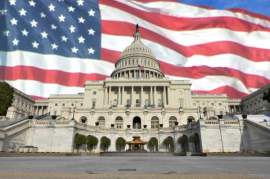
A Background to the Constitutional Convention

Popular In Constitution
Purpose Of Lifetime Appointment And Pros And Cons Enumerated Powers Bicameral Legislature Background Article 3 Of The Constitution We The People 1st Amendment Who Wrote The Constitution Judicial Review Equal Protection Clause 5th Amendment 10th Amendment Three Fifths Compromise
What is the Constitutional Convention?
The Constitutional Convention, which is also known as the Philadelphia Convention, was a conference that took place in Philadelphia in the year 1787 between May 5th and September 17th; the ratification of the Constitution of the United States signaled the end of the Constitutional Convention – this convention was called in order to solidify and finalize a finished Constitution of the United States.
What Spawned the Constitutional Convention?
The Articles of Confederation - the first piece of national legislature adopted by the United States of America subsequent to the end of the Revolutionary – served as the primary piece of administrative legislation after gaining their respective independence from England:
The authors of the Constitution of the United States cited the Articles of Confederation to be reactionary to the unpleasant conditions under which citizens of the United States lived with regard to the totalitarian rule under King George II of England
The authors of the Constitution deemed that the lack of any governmental power established a lack of organization, as well as national unity
The Articles of Confederation limited the jurisdiction of the central government to the military, postal service, regulation of currency, and the authorization of foreign policy
The central government was granted no authority over the 13 states, which were considered to be sovereign bodies
Which Events Preceded the Constitutional Convention?
In 1785, a Convention was held at Mt. Vernon – commonly referred to as the Mount Vernon Convention - in order to discuss potential action with regard to the separation of the Potomac River with regard to the vague precepts conveyed within the Articles of Confederation. Federalists Alexander Hamilton and James Madison, as well as pundits including Benjamin Franklin and George Washington were in attendance – as a result of this meeting, the replacement of the Articles of Confederation in lieu of an updated legislature was proposed.
Ratification and the Constitutional Convention
Due to a variety of complication within the approval process – stemming from varying degrees of disapproval from individual State legislature, the Constitution of the United States underwent a vast array of editing and adjustment. The Final draft of the Constitution of the United States was ratified on September 17th, 1787; 12 of the 13 United States approved of the Constitution – Rhode Island was the only state that refused to ratify the Constitution
States in Attendance at the Constitutional Constitution
Although 9 States initially participated in the Ratification of the Constitution on an individual basis, each of the original 12 States subsequently ratified the Constitution:
Delaware
Pennsylvania
New Jersey
Georgia
Connecticut
Massachusetts
Maryland
South Carolina
New Hampshire
Who Attended the Constitutional Convention?
Subsequent to the conference in Mt. Vernon, a draft of the Constitution of the United States was completed as a result of the Constitutional Convention; 39 individuals signed the Constitution of the United States – the following influential figures were in attendance at the Constitutional Convention:
Alexander Hamilton, both a state representative from New York, as well a member of the Federalist Party, has been credited with the initial ideology expressed in the Constitution
James Madison is renowned for his contribution to the authorship of the Federalist Papers, as well as the recognition with regard to the facilitation of the Bill of Rights
George Washington was appointed as the head of the Constitutional Convention by the attendees



















